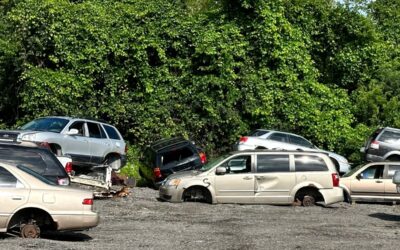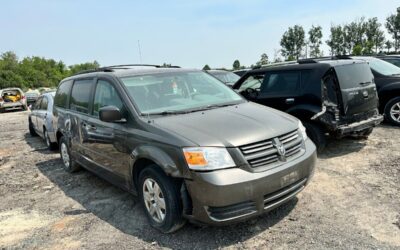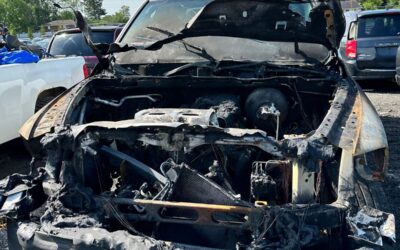Introduction
When you’re ready to stop using your vehicle — whether it’s reached the end of its life, is being sold for parts, or is heading for scrap — you’ll need to remove it from your name. In Ontario, you must remove the vehicle from your name so you’re not liable for fines, parking tickets, or other risks down the road. Knowing how to deregister a car correctly helps avoid surprise costs and protects your record. This guide will walk you through when to deregister a car, what steps to take, and how companies such as Greenway Auto Recycling can help when your vehicle is destined for the scrap yard.
When Do You Need To Deregister a Vehicle?
Here’s when deregistration becomes necessary.
1. Vehicle is being scrapped or recycled
If the vehicle is no longer roadworthy, you’ve decided to send it to a scrapyard, or you want to recycle its parts, you must deregister so you’re no longer the legal owner. Without this, you could still be held responsible.
2. Vehicle is sold for parts or dismantled
When you sell a vehicle to a dismantler or for parts, it is effectively removed from active use. Deregistering ensures the ownership record reflects this.
3. Vehicle is exported or permanently removed from Ontario
If the vehicle leaves the province and you will not use it here again, it’s wise to deregister so you’re not on record as the owner when you no longer hold the vehicle.
What You Should Check Before Deregistration
Make sure you have the proper documentation and status before you proceed.
- Confirm you hold the ownership permit (the green vehicle permit) and the plate portion if you’re keeping the licence plates.
- Remove any personal items and ensure the vehicle’s VIN matches the permit.
- If the vehicle is being scrapped, verify you’re using a licensed scrap-car service (for instance, a company like Greenway Auto Recycling) to handle the process legally.
- Clear any outstanding fines, tolls or debts tied to the vehicle so you don’t get held responsible later.
- Decide whether you will return the licence plates or keep them for future use (in Ontario, plates often follow the owner, not the vehicle).
Step-By-Step Process To Deregister Your Vehicle
Here is a clear list of what to do.
- Stop using the vehicle on the road: Driving it when it’s not properly registered or insured can lead to tickets and liability.
- Obtain proof of what you’re doing with the vehicle: If the car is being scrapped, get a removal receipt or certificate from the scrapyard. Many licensed scrap yards can complete the ownership transfer on your behalf, saving you a trip to ServiceOntario.
- Remove or keep your licence plates: You often keep them because they belong to you, not necessarily the car. Reddit users note that you don’t always have to return them if you plan to reuse them.
- Visit a ServiceOntario centre and bring:
– Your driver’s licence or ID
– The original vehicle permit
– The plate portion (if you’re keeping the plates)
– The licence plates (if you’re returning them)
– Any scrap-or-removal certificate, if applicable
At ServiceOntario, indicate that you are surrendering the vehicle ownership and deregistering the vehicle from your name. - Request a record update: Ensure the vehicle is removed from your name and the status changed to ‘sold’, ‘scrapped’, or otherwise no longer in active use. This protects you.
- Check for refunds if applicable: If you returned the plates early or cancelled registration, you might be eligible for a credit or refund on plate sticker fees (for heavy commercial vehicles or snow vehicles) through ServiceOntario.
Also Read: License Plate Renewal In Ontario: Everything You Need To Know
How Does Scrapping with a Specialist Help?
A professional service like Greenway Auto Recycling can simplify the process if your car is headed for recycling. They often offer:
- Free removal of the car from your property.
- Legal disposal and recycling of vehicle parts to meet Ontario laws.
- Assistance with documentation is needed so your ‘deregistration’ is smoother and there are fewer risks for you after the vehicle leaves.
Working with a licensed car-recycling partner ensures your vehicle is legally dismantled and recycled — protecting you from fines or liability later.
Common Mistakes to Avoid
- If plates are not removed properly or ownership is not removed, you could still be linked to the vehicle.
- Using an unlicensed scrap yard: Legal risk, environmental risk, and possible fines.
- Leaving fines/tolls unpaid: They stay with the vehicle record and can return to you.
- Assuming deregistration happens automatically, Ownership may still show in your name unless you take the steps.
What Happens After Deregistration?
- Your name is no longer on the vehicle record — you’re not responsible for its future use.
- Plates you kept can be reused when you buy another car.
- You can safely cancel insurance for the vehicle (if you haven’t already done so).
- If you choose that path, a scrap yard or recycling business handles the disposal.
Conclusion
Deregistering a car in Ontario requires a few extra steps. But it’s worth doing to avoid legal tangles or cost surprises later. Greenway Auto Recycling offers hassle-free scrap car removal and deregistration in Ontario, helping you complete the process legally and stress-free. Get the ownership transferred, clear the plates or keep them, and handle the paperwork. Then you can breathe easier knowing you’ve done things properly. When you’re ready to scrap your car, sell it for parts, or simply remove it from active use, Greenway Auto Recycling stands ready to help with professional scrap car removal and ensure the deregistration process is handled cleanly in Ontario.





